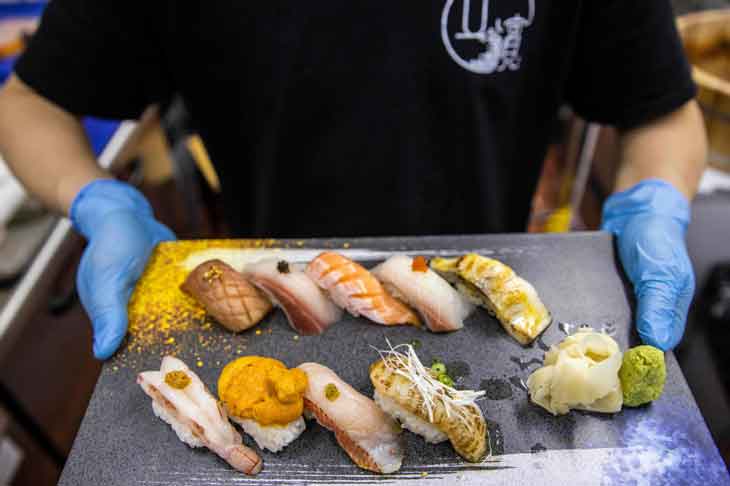Come gather around readers; I have a story to tell. It’s about an angry chef and a woman he attempted to send to hell. A cautionary tale of rage and cancel culture, with social media pile-ons led by self-righteous internet vultures.
Successful Puerto Rican chef and restaurateur Eric Rivera chose to publicly humiliate an Australian woman for having the audacity to open a sushi bar in New York City. Known only as ‘Sushi Sheila’, the woman in question had always wanted to open a sushi restaurant. The budding entrepreneur made the decision to quit her job in the city and open a restaurant called Sushi Counter in the West Village neighbourhood of lower Manhattan after documenting her journey on Tik Tok.
All was going well; she was gaining followers and building support. This did not sit well with Rivera, who shared one of her videos on X (formerly Twitter) with his 15,000 followers, calling her a ‘coloniser’ for attempting to financially gain from selling Japanese cuisine as a white Australian. ‘If you don’t see why this is a problem,’ Rivera followed up, ‘you are part of the problem.’
Cue outrage. A cesspit of collective intolerance at the best of times, keyboard warriors and online activists took to Twitter as she became the latest subject for the Orwellian two minutes of hate. Sushi Sheila was deluged with comments, accused of ‘gentrification’ and, of course, ‘cultural appropriation’. People, some of whom I assume have never heard of her – let alone been anywhere near her restaurant – suddenly became internet food critics. The Google Maps page was flooded with fake one-star reviews. She had to delete her TikTok videos and her recent social media activity as a result of the backlash.
For identitarians, race will always be the focal point of the debate. Judged by the inverted law of progressivism ‘logic’, ‘Sushi Sheila is unqualified to make and distribute sushi because she is a white Australian. She simply cannot create authentic Japanese food. As one social media user asked rhetorically, ‘Why is someone who is not of Asian descent, better yet from Australia, opening a sushi spot in NYC?’
No idea in the illogical vocabulary of social justice ideology is more idiotic than cultural appropriation, with the exception of the complete eradication of women’s rights. By spouting this fashionable shibboleth, modern identitarians are convinced it will help highlight the exploitative nature of capitalism. This idea is not only illiberal; it is anti-trade. It stands alone in its rejection of the centuries’ worth of advancements in international commerce.
For centuries, networks of trade have facilitated not only the exchange of goods and services but also of ideas and customs. Through systems of global trade, a new product has the potential to revolutionise our behaviour; it can move us forward, both culturally and ethically. In The Structures of Everyday Life: Civilization and Capitalism 15th-18th Century, the French historian Fernand Braudel writes that the importation of the knife and fork from Italy meant customs– such as table manners and etiquette – became popular and dominant in the 16th century. To be an advocate of cultural appropriation entails being opposed to ideas and innovation. It is regressive rather than progressive.
Western culture is irrevocably intertwined with the culture of others. It would be harder to find examples of Western cuisine that have not been ‘co-opted’ by the process of ‘cultural appropriation’. Our culinary history is one that is predominantly multicultural. One of the greatest joys of living in an ethnically diverse society is the wide variety of cuisine we have been able to enjoy for decades. Take curry for example. Dishes like tikka masala and vindaloo are regularly named Britain’s favourite foods. The two key ingredients used in these dishes – dried red chillies and vinegar – are not, contrary to what some might say, native to Asia. They arrived in Goa via Portuguese traders in the 16th century.
These self-appointed moral guardians of the culinary arts have, in their time, proclaimed just about everything to be an issue of cultural appropriation. My local university once banned sombrero hats for fear they would offend Mexican students. I could go on, but I am sure you all have your own examples.
The double standards of those who ascribe to the ‘theory’ of cultural appropriation are interesting, to say the least. While busy cyber-shaming Sushi Sheila, Rivera appears to have forgotten that he plans to open a Puerto Rican/Japanese fusion restaurant in North Carolina. And even a cursory glance would reveal Rivera is not Japanese – he looks more like a Latin Leo Sayer. He has also written numerous cookbooks specialising in Korean, French and Italian cuisine.
Yet despite what her critics have thrown at her, Sushi Sheila has never claimed she will sell ‘authentic’ Japanese sushi. The USP of Sushi Counter is her Australian-style sushi. As with the tikka example, it has been developed to better suit the local palate. In Australia, it features salmon, cooked tuna and spicy shrimp often sold as larger rolls. There’s no colonisation at work; it’s just the result of two cultures blending together and evolving over time. It’s not cultural appropriation; it’s cultural appreciation.
Rivera should really take a trip to New York. Most of the sushi restaurants in the Big Apple are not owned by the Japanese but are in fact Chinese. Plus, unlike other sushi restaurants in NYC, hers is affordable ($12 for three rolls sounds cheap).
Twitter used to be a place where you could have a laugh and joke with like-minded people. Now it is little more than a hotbed of emotionally incontinent morons attacking each other in an attempt to ruin people’s lives. By amplifying the voices of a small group of moral absolutists, it enables what the academic Nassim Nicholas Taleb calls ‘the tyranny of the minority’.
Anyway, I told you this had a good ending. An online pro-Sushi Sheila group fought back. Users on Twitter decided to counter the negative reviews with five-star ones. No one deserves to be cancelled, especially not for sushi.
Got something to add? Join the discussion and comment below.
Get 10 issues for just $10
Subscribe to The Spectator Australia today for the next 10 magazine issues, plus full online access, for just $10.
You might disagree with half of it, but you’ll enjoy reading all of it. Try your first month for free, then just $2 a week for the remainder of your first year.














Comments
Don't miss out
Join the conversation with other Spectator Australia readers. Subscribe to leave a comment.
SUBSCRIBEAlready a subscriber? Log in